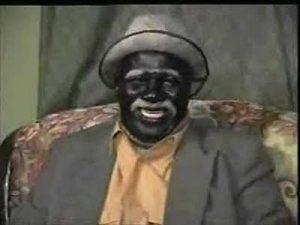By Akeem Lasisi
In the past few years, Baba Suwe elastically battled to stay alive. He spent all he had – money, goodwill and more. But, because it is eternally true that you can only cure an ailment and not death, the legendary comedian has gone the way of his ancestors. As a proof of the end of a compelling era, he was buried in his Ikorodu, Lagos home on Thursday, November 25.
Yet, nature may have so proved again that death is no comedy, Baba Suwe considerably demonstrated that life could be laughter, or the art of spinning it. Acting his way to the limelight in the early 90s, he bestrode the stage and screen with his craft – for up to about two decades. So popular did he become that, whenever anyone in real life appeared to act odly in many places within and outside Nigeria, the fellow’s neighbour would tell them: stop acting like Baba Suwe.
But what factors made his comedy so popular and thick? For, considering the fact that he hailed from a Yoruba theatre tradition that produced many successful comedians such as Baba Sala, Baba Mero, Lukuluku, Alaran, Jacob, Ajimajasan (all late); Aderupoko, Papalolo, Aluwe, Afeez Oyetoro (Saka), Sanyeri etc., it may not be impossible to define or redefine him based on his stage antics. And the first was/is too obvious to ignore: body painting.

One of the ways he established himself as a comedian was the clumsily dark face he presented, painting it with dye, charcoal – or whatever substance he applied. This served as a foundation for other theatrics he vomited while acting, as seeing him alone had the potential to invoke laughter. While a Baba Sala or Ajimajasan were hardly into such a gimmick, Lukuluku and Alaran also indulged in it, with Iyaniwe and a few others also cultivating it.
Still talking about appearance, Baba Suwe loved to dress clumsily like many other comedians. His was a costume in which you would, proverbially speaking, see Saturday peeping out of the costume of Sunday. You know, Yorubas would say, ‘Satide yo labe Sunday’ in the context. In this wise, Baba Suwe, who could put a T-shirt on a buba and soro, or outright on an agbada, reminded one of what Baba Sala or Jacob – the latter of the Jesters International fame – also often did.

But it would be odd not to, as quickly as possible, recall the main stylistic element – a peculiar one – that first sold Baba Suwe to the audience. In the early days, he enjoyed turning Yoruba proverbs upside down. In his TV dramas, he would try to prove wrong the wisdom in any Yoruba proverb said by a fellow character. This readily gave him an identity, with the audience tending to expect what he would say immediately the other actor introduced the proverb. This style endured with Baba Suwe as he carried it into the Nollywood era. No wonder, up to this moment, if someone uses a proverb, it is not unexpected that another person will respond, ‘You had better not say that in the presence of Baba Suwe!’ In Larinloodu, someone reminds him that ‘A kii fa’ri leyin olori’, meaning, you don’t shave a man’s hair in his absence. The argument is, to Baba Suwe, flawed as he tells the fellow that you can fa’ri leyin olori if the person is drugged.
Still on language matters, the comedian who cherished saluting himself as Adimeru loved to amuse people by bastardising English expressions. He thus shares a trait with veteran Zebrudaya in this respect. To him, a landlord is a larinloodu, First Lady could come out as Best Lady or False Lady, while ‘immigration’ could be ‘insgrasion’ in his learned mouth. This might not be peculiar to him as an actor but it was definitely one of his strengths. Apart from sparking laughter with it, he at times exploited it to create artistic confusion and suspense. More examples from Baba Suwe: gege soup for pepper soup; Haris cream for Irish cream; toosan for thousand and limstick for lipstick.

Close to bad ‘Englishing’ is eroticism. Baba Suwe was one dramatist not scared to be sexually vulgar on stage or screen. Moralists might challenge him on this, but it is also said that sex sells. This is not to say that he really called a spade a spade whenever referring to organs or sexual acts. In movies, he would endlessly, for instance, threaten to scatter a woman’s temple with his ample banana, always saluting himself (his character/role) as one that would handle the female character the way her husband could never do.
Language-wise, Baba Suwe also strategically made use of songs. He particularly enjoyed excursing into fuji – especially that of Sikiru Ayinde Barrister. He could introduce Obesere’s songs when he wanted to harass a woman – since the fuji musician, Abas Akande Obesere, is asakasa/eroticism personified. Baba Suwe also borrowed songs from other genres, including juju, to make some points or as an interlude in his works.
Out of language studio, one could also note that Baba Suwe’s combination with his wife, Moladun, was like a magic to his career. The way Baba Sala and Iya Sala combined well (though Iya Sala was actually not Baba Sala’s wife, but that of fellow actor Okondo), Baba Suwe and Moladun were a delight to watch. Exchange of banters between them, with Moladun punching with her Ibadan dialect, while complementing Baba Suwe’s clumsy costume with her own lousy apparel, helped to deepen the comedy of the deceased. This was to the extent that many believe that Moladun’s untimely death in 2009 was like the death of something crucial in the man’s humour business. Unfortunately, both are no more, though they bequeathed to the world dramas and movies that will continue to crack ribs with laughter. Their graves now lie beside each other in Ikorodu.

Of course, the name he adopted – Baba Suwe – was also an element of style or packaging. He was coming at a time some of the comedians who had made an impact could be Baba this and that. There were Baba Sala, Baba Mero and Baba Sabiko, for instance. There is Baba Gebu too. There was also Iya this and that, with Iyaniwe and Iya Awero still very much around. I do not know the genesis of his ‘Baba Suwe’ though I learnt that there is a Suwe in the actor’s family. More importantly, the tag resonated well in a comedy environment, especially with the adoption of ‘Suwe’ instead of any other tender or trendy appellation.
One can only hope that the reflection here help put the comedian’s comedy in perspective. One should be conscious of the fact that there are folks who find some of the antics not funny or they even find them repulsive. As earlier noted, moralists would denounce the comedian’s erotic vibes. Others have also argued that Baba Suwe and some other Nigerian/Yoruba comedians are prone to overstretching scenes with two many words. There will always be the question of preferences or weak points, too. The fact, however, remains that Baba Suwe commanded millions of fans who loved and appreciated his drama. He poured himself into his talent to entertain others, so that, even as he was being committed to the mother earth, his spirit was likely to boast: ‘If life is a joke, Baba Suwe cracked his best.’



